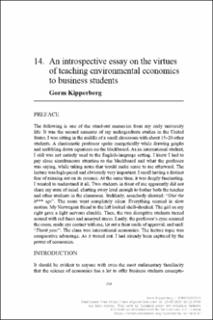| dc.contributor.author | Kipperberg, Gorm | |
| dc.date.accessioned | 2024-01-15T12:35:51Z | |
| dc.date.available | 2024-01-15T12:35:51Z | |
| dc.date.created | 2023-12-04T11:23:29Z | |
| dc.date.issued | 2023 | |
| dc.identifier.citation | Kipperberg, G. (2023) An introspective essay on the virtues of teaching environmental economics to business students. In B.T. Asheim, T. Laudal & R.J. Mykletun (Eds) Practicing Responsibility in Business Schools Implications for Teaching, Research, and Innovation, pp. 284-314 | en_US |
| dc.identifier.isbn | 9781035313167 | |
| dc.identifier.uri | https://hdl.handle.net/11250/3111536 | |
| dc.description.abstract | The following is one of the stand-out memories from my early university life: It was the second semester of my undergraduate studies in the United States. I was sitting in the middle of a small classroom with about 15–20 other students. A charismatic professor spoke energetically while drawing graphs and scribbling down equations on the blackboard. As an international student, I still was not entirely used to the English-language setting. I knew I had to pay close simultaneous attention to the blackboard and what the professor was saying, while taking notes that would make sense to me afterward. The lecture was high-paced and obviously very important. I recall having a distinct fear of missing out on its essence. At the same time, it was deeply fascinating. I wanted to understand it all. Two students in front of me apparently did not share my state of mind, chatting away loud enough to bother both the teacher and other students in the classroom. Suddenly, somebody shouted: “Shut the h*** up!”. The room went completely silent. Everything seemed in slow motion. My Norwegian friend to the left looked shell-shocked. The girl on my right gave a light nervous chuckle. Then, the two disruptive students turned around with red faces and annoyed stares. Lastly, the professor’s eyes scanned the room, made eye contact with me, let out a faint smile of approval, and said: “Thank you!”. The class was international economics. The lecture topic was comparative advantage. As it turned out, I had already been captured by the power of economics. | en_US |
| dc.language.iso | eng | en_US |
| dc.publisher | Elgar Online | en_US |
| dc.relation.ispartof | Practicing responsibility in business schools : Implications for teaching, research, and innovation | |
| dc.rights | Navngivelse-Ikkekommersiell 4.0 Internasjonal | * |
| dc.rights.uri | http://creativecommons.org/licenses/by-nc/4.0/deed.no | * |
| dc.subject | økonomi | en_US |
| dc.subject | utdanningsvitenskap | en_US |
| dc.subject | handelshøyskoler | en_US |
| dc.title | An introspective essay on the virtues of teaching environmental economics to business students | en_US |
| dc.type | Chapter | en_US |
| dc.description.version | publishedVersion | en_US |
| dc.subject.nsi | VDP::Samfunnsvitenskap: 200::Økonomi: 210 | en_US |
| dc.source.pagenumber | 284-314 | en_US |
| dc.identifier.doi | 10.4337/9781035313174.00028 | |
| dc.identifier.cristin | 2208283 | |
| cristin.ispublished | true | |
| cristin.fulltext | original | |
| cristin.qualitycode | 2 | |

